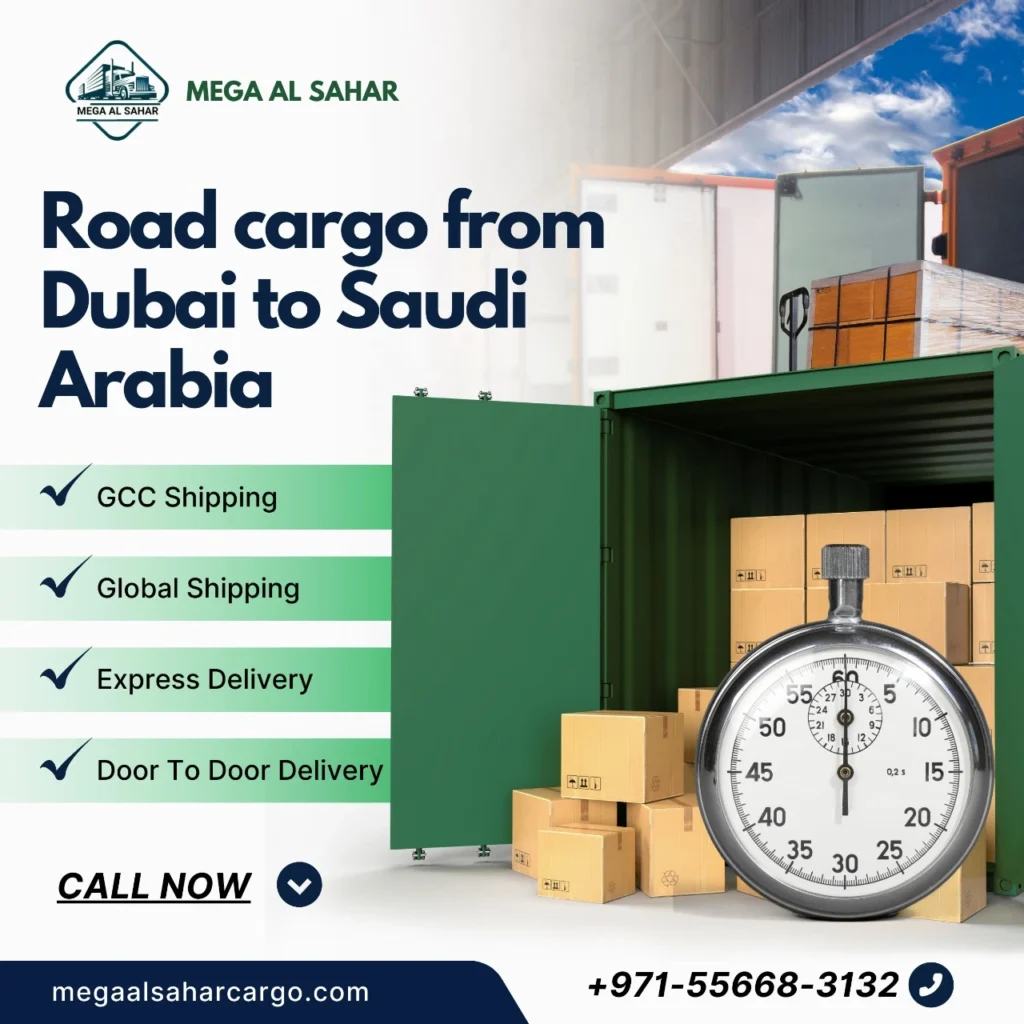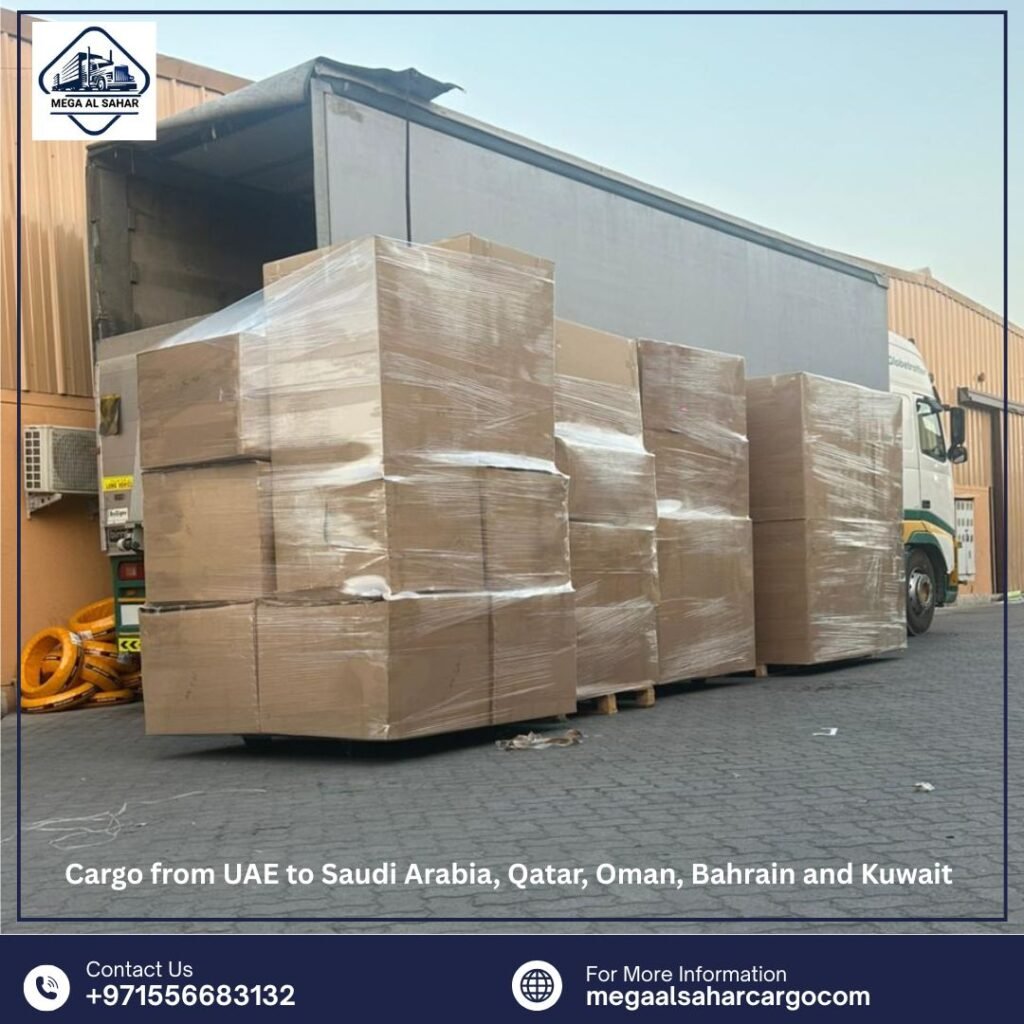What are the common routes for LTL shipping between major cities in the UAE and Saudi Arabia (such as Dubai to Riyadh, Abu Dhabi to Jeddah, Sharjah to Dammam)?
Major Road Cargo Routes from Dubai to KSA
Dubai’s strategic connectivity with Saudi Arabia allows for multiple road transport routes that ensure smooth transit. Some of the major cargo routes include:
- Dubai to Riyadh: This route is one of the busiest for commercial trade and is approximately 1,000 km long, passing through Abu Dhabi and crossing the UAE-Saudi border at Al Batha.
- Dubai to Jeddah: Covering a distance of around 1,800 km, this route is used mainly for commercial and industrial shipments and passes through Riyadh before reaching Jeddah.
- Dubai to Dammam: Approximately 700 km long, this is one of the shortest and most frequently used routes due to the trade connections between the UAE and Saudi Arabia’s Eastern Province.
Other Popular LTL Transport Routes
While Dubai remains the primary gateway, neighboring emirates also play a vital role in facilitating road cargo to key Saudi cities:
- Abu Dhabi to Jeddah: Reliable and secure LTL (Less-than-Truckload) services connect Abu Dhabi directly to Jeddah, supporting both business and personal shipments.
- Sharjah to Dammam: Fast and budget-friendly LTL transport options are available from Sharjah to Dammam, making it a preferred route for many companies seeking cost-effective delivery to the Eastern Province.
These established corridors not only accommodate full truckloads but also provide flexible LTL solutions, ensuring that businesses of all sizes can move their goods efficiently between the UAE and Saudi Arabia. Whether you’re shipping commercial inventory, industrial materials, or personal consignments, these routes form the backbone of cross-border logistics in the region.
What additional logistics or cross-border cargo services are offered for shipping between the UAE and neighboring countries?
With a well-maintained fleet of vehicles, experienced drivers, and expertise in cross-border logistics, Mega Al Sahar Cargo ensures hassle-free customs clearance and secure transport. From Dubai to key cities like Riyadh, Jeddah, Dammam, and more, we handle every aspect of the journey to ensure your cargo reaches its destination efficiently.
Mega Al Sahar Cargo Company for international land transportation services from Dubai, Abu Dhabi, Sharjah, Ajman, Ras Al Khaimah, and Fujairah to Saudi Arabia, Riyadh, Jeddah, Abha, Dammam, Al Khobar, Al Ahsa, Mecca, Medina, Al Dhaif, Yanbu, Tabuk and all of the Kingdom of Saudi Arabia. The best cars equipped for land transportation services from the Emirates to Saudi Arabia. Transporting furniture, cars, equipment, spare parts, and containers. From door to door
ROAD CARGO TO KSA DUBAI UAE Road Freight to Saudi
Opting for Road Cargo to KSA doesn’t just ensure security; It provides efficiency as well. Companies specializing in road freight often go the extra mile with services that extend beyond mere transportation. Whether you’re in favor of door-to-door services for maximum convenience or you lean towards port-to-port services for more control over your cargo, you’re covered.
When it comes to the Road Cargo to KSA, every mile is a testament to a well-orchestrated process that blends careful planning with diligent execution. Just imagine your cargo, safely tucked away and making its way through the miles, inching closer and closer to its destination in Saudi Arabia.
Overall, Road Cargo to KSA provides a mix of security, convenience, and efficiency. It’s a reliable option that gives you peace of mind, knowing your shipment is in good hands. While there are several ways to ship goods Road Cargo to KSA certainly carves a niche for itself, especially for those larger, more substantial shipments.
Road cargo from Dubai to Saudi Arabia
At Mega Al Sahar Cargo Company, we’ve taken the Road Cargo to KSA to an entirely new level. With our expansive fleet of high-tech vehicles, every shipment, big or small, receives the utmost care and protection. Our drivers aren’t just experienced – they’re specialists, trained to prioritize punctuality and navigate the fastest, most secure routes Road Cargo to KSA. So, whether it’s a single box or a full container load, you can be sure it’s in the safest hands with us. We’re not just delivering goods; we’re delivering peace of mind, one shipment at a time. Trust us to get your cargo where it needs to go – safely, securely, and right on schedule. With Mega Al Sahar Cargo Company, you get more than just a shipping service; you get a shipping partner committed to excellence.
Comprehensive Land Transport Coverage Across the GCC
Whether you need road freight from Dubai to Saudi Arabia, land cargo transport from the UAE to Saudi Arabia, or even dedicated moving services between Saudi Arabia and the UAE, we handle it all. Our expertise covers a broad spectrum of locations and cargo types—serving major cities and trade hubs such as Riyadh, Jeddah, Dammam, and also extending to Abu Dhabi, Sharjah, Ajman, and beyond. We provide seamless cross-border cargo solutions, including reliable transport from Jebel Ali to Riyadh and efficient services from Dubai to Dammam.
Our comprehensive offering isn’t limited to one-way shipments; we facilitate cargo movements from the UAE to KSA and vice versa, covering commercial, industrial, and personal goods. Whether you’re shipping from Dubai, Abu Dhabi, or Sharjah, or moving goods from KSA back to the Emirates, our network and experience ensure your cargo arrives safely, every time.
- Dubai Moving Services
- Cargo Services to Muscat
- Road Transportation Services to KSA
- Transport Services to Qatar
- Transport Services to Oman
- Transport Services to Bahrain
- Shipping from Dubai to Kuwait
Road cargo transport between Dubai, UAE, and Saudi Arabia (KSA) is a critical component of the logistics industry in the Gulf Cooperation Council (GCC) region. The trade relationship between the two countries has strengthened over the years, leading to an increase in demand for efficient, cost-effective, and reliable road cargo services. Road freight is one of the most preferred modes of transportation due to its flexibility, affordability, and capability to handle a variety of goods, including perishables, industrial materials, and commercial shipments.
Importance of Road Cargo Transport to Saudi Arabia
Dubai serves as a major logistics hub in the Middle East, with its world-class infrastructure, strategic location, and well-developed road networks. Saudi Arabia, being the largest economy in the GCC, has an increasing need for imported goods, raw materials, and equipment. Road cargo transportation offers several advantages, including:
- Cost-Effectiveness: Road freight is generally more economical compared to air freight, making it an attractive option for bulk and heavy shipments.
- Speed & Efficiency: With the right logistics planning, goods can be transported from Dubai to major Saudi cities like Riyadh, Jeddah, and Dammam in a timely manner.
- Flexibility: Road transport allows for door-to-door deliveries and better handling of customized cargo needs.
- Reliability: Well-maintained highways and border facilities enable smooth and secure cargo movement.
Major Road Cargo Routes from Dubai to KSA
Dubai’s strategic connectivity with Saudi Arabia allows for multiple road transport routes that ensure smooth transit. Some of the major cargo routes include:
- Dubai to Riyadh: This route is one of the busiest for commercial trade and is approximately 1,000 km long, passing through Abu Dhabi and crossing the UAE-Saudi border at Al Batha.
- Dubai to Jeddah: Covering a distance of around 1,800 km, this route is used mainly for commercial and industrial shipments and passes through Riyadh before reaching Jeddah.
- Dubai to Dammam: Approximately 700 km long, this is one of the shortest and most frequently used routes due to the trade connections between the UAE and Saudi Arabia’s Eastern Province.
Types of Cargo Transported by Road to KSA
Different industries rely on road cargo transport for various types of goods. Some of the major cargo categories transported include:
- Consumer Goods: FMCG (fast-moving consumer goods) like food, beverages, and household products are frequently shipped from Dubai to Saudi Arabia.
- Automotive & Spare Parts: Dubai serves as a key re-export hub for automotive parts and vehicles destined for Saudi Arabia.
- Industrial & Construction Materials: Steel, cement, and construction equipment are commonly transported for ongoing infrastructure and development projects.
- Perishable Goods: Fresh fruits, vegetables, dairy products, and frozen goods require specialized refrigerated transport.
- Electronics & Machinery: High-value electronics, industrial machinery, and IT equipment are also transported via road.
Road Cargo Services & Solutions
Several logistics companies in Dubai specialize in providing road cargo transport to Saudi Arabia, offering a range of services, including:
- Full Truck Load (FTL) Services: Suitable for large shipments that require the entire truck space, ensuring faster delivery and minimal handling.
- Less Than Truck Load (LTL) Services: Cost-effective for smaller shipments that do not require a full truck, allowing businesses to share cargo space.
- Temperature-Controlled Transport: Specialized trucks for perishable and sensitive goods, ensuring they are transported under controlled conditions.
- Heavy Equipment & Project Cargo Transport: Includes oversized cargo, machinery, and construction materials requiring special handling and permits.
- Door-to-Door Delivery Services: Ensures seamless pickup from Dubai and delivery to various destinations in Saudi Arabia.
- Customs Clearance & Documentation: Hassle-free border crossing with proper documentation and compliance with KSA import regulations.




